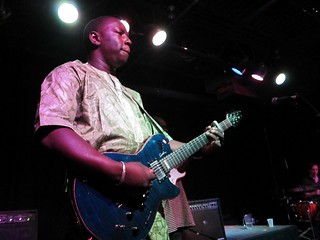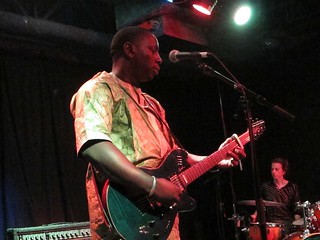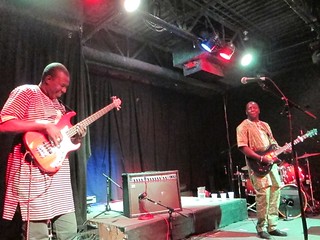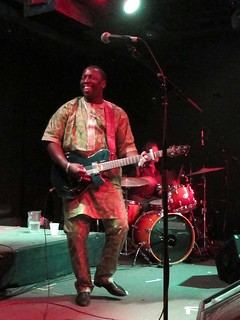American roots music, but never primitive

From the beginning of his career, Fulks has idolized that early vision of country music. After failing to fit into the Nashville machine, he turned his back on modern country. But although his writing has shown a great sense of character and phrasing, his records as a whole have seldom connected directly to the traditional purity he touts. A couple of albums have each offered a piece of the puzzle. 13 Hillbilly Giants (2001) gets at that old sound with his interpretation of some lesser known country songs, while 2005's Georgia Hard focused on a late '60s/early /'70s version of the genre. Gone Away Backward bridges the gap to explore a mix of moody folk, raw country, and vibrant bluegrass, without a hint of alt-country irony or self-consciousness. As the song fall like dominoes, Fulks celebrates this old time feel, showing that clarity and sincerity don't have to be simplistic.
The opening track, "I'll Trade You Money For Wine", leads off with restless folk guitar and a fiddle that adds a patina of despair. Fulks' gentle drawl is simultaneously mournful and judgmental. The tune relies on a dark, relentless murder-ballad sound but the lyrical theme is complex and contradictory as he celebrates a surrender into dissolution from a seemingly morally superior perspective. So, "It's a short life and a long time underground/ I'll trade you money for wine" vies with philosophical dissections of industry and his lack of envy for the local banker. The ambiguity proves to be a potent gateway into the album. Despite this scattershot description, the song flows naturally, carrying you deeper into the mood.
After a John Prine style folk tune and a rollicking bluegrass number, the album finds its essence on the aforementioned "That's Where I'm From". Fulks matches the lyrical depth with a beautiful arrangement. His simple guitar part is gradually joined by the other other instruments -- bass, fiddle, mandolin, and banjo -- adding their voices like ghosts of the past standing behind him. As he raises his voice, forthright and unaffected, he captures a mix of poignancy and pride. The closing solos crown the piece perfectly, emotionally sincere without a trace of schmaltz.
The rich acoustic ambiance of Gone Away Backward is only compromised twice, with the subtle slide distortion on the rambling instrumental, "Snake Chapman's Tune", and the odd-bird track, "The Many Disguises of God". This latter song starts with an old British folk feel, with a waltz rhythm and fingerstyle guitar. Arty and sparse, the arrangement uses fiddle and the wicked sizzle of electric guitar fuzz to add an ominous haze that builds into a miasma of dread. Although at first listen it might clash with the folk-based approach on the rest of the album, the allegorical narrative does suggest an earlier time.
As much as I've enjoyed Fulks' earlier work, from the wry self-delusion of "You Wouldn't Do That To Me" (SouthMouth - 1997) to the dark cynicism of "God Isn't Real" (Let's Kill Saturday Night - 1998), this set of songs may well be the best that he's written. I wouldn't mind a little more of his sarcastic wit, but I appreciate the way Gone Again Backward commits to its theme and delivers so consistently.

"If you've ever heard Hank Williams sing/ Well, you know the whole blessed thing." Robbie Fulks gets right to the heart of it on "That's Where I'm From", which could have easily served as the title of his new release because Gone Away Backward takes him back to his true love of American roots music. On this song, indeed on the whole album, Fulks aspires to Hank Williams' plain simplicity, but he can't hide his own polish. While Williams drew on a raw power, virtually inventing country music from its folk origins, Fulks has built on this foundation to become an eloquent voice for his musical ideal. Given the shoulders that he stands upon, the last lines of "That's where I'm From" call it right: "A long way down a hard road, that's where I've come/ Someplace I can't go home to, that's where I'm from."
From the beginning of his career, Fulks has idolized that early vision of country music. After failing to fit into the Nashville machine, he turned his back on modern country. But although his writing has shown a great sense of character and phrasing, his records as a whole have seldom connected directly to the traditional purity he touts. A couple of albums have each offered a piece of the puzzle. 13 Hillbilly Giants (2001) gets at that old sound with his interpretation of some lesser known country songs, while 2005's Georgia Hard focused on a late '60s/early /'70s version of the genre. Gone Away Backward bridges the gap to explore a mix of moody folk, raw country, and vibrant bluegrass, without a hint of alt-country irony or self-consciousness. As the song fall like dominoes, Fulks celebrates this old time feel, showing that clarity and sincerity don't have to be simplistic.
The opening track, "I'll Trade You Money For Wine", leads off with restless folk guitar and a fiddle that adds a patina of despair. Fulks' gentle drawl is simultaneously mournful and judgmental. The tune relies on a dark, relentless murder-ballad sound but the lyrical theme is complex and contradictory as he celebrates a surrender into dissolution from a seemingly morally superior perspective. So, "It's a short life and a long time underground/ I'll trade you money for wine" vies with philosophical dissections of industry and his lack of envy for the local banker. The ambiguity proves to be a potent gateway into the album. Despite this scattershot description, the song flows naturally, carrying you deeper into the mood.
After a John Prine style folk tune and a rollicking bluegrass number, the album finds its essence on the aforementioned "That's Where I'm From". Fulks matches the lyrical depth with a beautiful arrangement. His simple guitar part is gradually joined by the other other instruments -- bass, fiddle, mandolin, and banjo -- adding their voices like ghosts of the past standing behind him. As he raises his voice, forthright and unaffected, he captures a mix of poignancy and pride. The closing solos crown the piece perfectly, emotionally sincere without a trace of schmaltz.
The rich acoustic ambiance of Gone Away Backward is only compromised twice, with the subtle slide distortion on the rambling instrumental, "Snake Chapman's Tune", and the odd-bird track, "The Many Disguises of God". This latter song starts with an old British folk feel, with a waltz rhythm and fingerstyle guitar. Arty and sparse, the arrangement uses fiddle and the wicked sizzle of electric guitar fuzz to add an ominous haze that builds into a miasma of dread. Although at first listen it might clash with the folk-based approach on the rest of the album, the allegorical narrative does suggest an earlier time.
As much as I've enjoyed Fulks' earlier work, from the wry self-delusion of "You Wouldn't Do That To Me" (SouthMouth - 1997) to the dark cynicism of "God Isn't Real" (Let's Kill Saturday Night - 1998), this set of songs may well be the best that he's written. I wouldn't mind a little more of his sarcastic wit, but I appreciate the way Gone Again Backward commits to its theme and delivers so consistently.
 The octopus has many arms and sometimes, the left, er.. tentacle can’t quite guess what the others are up to. Rather than settle for a definable sound,
The octopus has many arms and sometimes, the left, er.. tentacle can’t quite guess what the others are up to. Rather than settle for a definable sound, 
 It's hard to remember
It's hard to remember 








 It was just another case of Mercury poisoning, although, at the time, it looked like natural causes. In 1995, the Refreshments signed with Mercury Records. Their first album, Fizzy Fuzzy Big & Buzzy, came out the next year and “Banditos” became their breakout, unavoidable single. The attitude – “Everybody knows/ That the world is full of stupid people” – was delivered with tight, power-pop harmonies and the guitar hook was immaculate. Fully hyped with a whirlwind tour, the band made the rounds until Mercury pushed them back in the studio. The resulting album, The Bottle & Fresh Horses, came out in 1997 and undeservedly became their sophomore slump. Much as Graham Parker complained in his 1970 song, “Mercury Poisoning”, “Their promotion’s so lame/ They couldn’t ever take it to the real ballgame,” the Refreshments found themselves neglected by the label and the album quickly sank. By the end of ‘97, they left Mercury and lasted a few months before they broke up later in 1998.
It was just another case of Mercury poisoning, although, at the time, it looked like natural causes. In 1995, the Refreshments signed with Mercury Records. Their first album, Fizzy Fuzzy Big & Buzzy, came out the next year and “Banditos” became their breakout, unavoidable single. The attitude – “Everybody knows/ That the world is full of stupid people” – was delivered with tight, power-pop harmonies and the guitar hook was immaculate. Fully hyped with a whirlwind tour, the band made the rounds until Mercury pushed them back in the studio. The resulting album, The Bottle & Fresh Horses, came out in 1997 and undeservedly became their sophomore slump. Much as Graham Parker complained in his 1970 song, “Mercury Poisoning”, “Their promotion’s so lame/ They couldn’t ever take it to the real ballgame,” the Refreshments found themselves neglected by the label and the album quickly sank. By the end of ‘97, they left Mercury and lasted a few months before they broke up later in 1998.